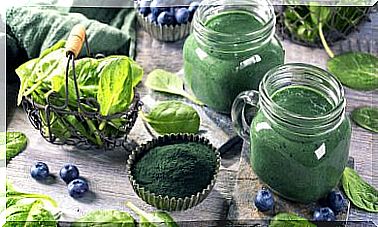Rhodiola Rosea: Uses, Benefits And Contraindications
Being considered an adaptogen, the root of Rhodiola rosea is related to a decrease in stress and fatigue. Let’s see in detail other of its benefits, as well as possible side effects.

Since Rhodiola rosea is a plant that grows in northern Europe and Asia and eastern North America, it is not surprising that traditional medicine has used it to treat altitude sickness and withstand the harsh climatic conditions in these areas.
At present other characteristics and benefits are attributed to it. Some believe that rhodiola, the plant’s more widespread name, is an adaptogen, that is, a substance that increases resistance to stress.
In the same way, its root is a source of active compounds that would provide benefits, such as improving brain function, reducing the symptoms of depression and controlling diabetes. We show you everything you need to know about this plant.
7 benefits of Rhodiola rosea
The medicinal applications of Rhodiola rosea date back to the Vikings, who used this plant to increase its resistance. Discover what benefits it could offer you according to science.
1. Reduce stress
Rhodiola is an adaptogen . According to studies published in the International Journal of Psychiatry in Clinical Practice and Phytotherapy Research , consuming these types of substances in stressful situations can improve the way we deal with stress.
Likewise, other research published in Phytotherapy Research found that ingesting 400 milligrams of rhodiola extract per day for 4 weeks significantly alleviates stress symptoms (fatigue, exhaustion, and anxiety) after 3 days.
Finally, a study in 118 people who had stress exhaustion, showed that Rhodiola rosea reduced anxiety levels and symptoms associated with depression.
2. Fight fatigue
Fatigue is often related to stress, anxiety, and lack of sleep. Fortunately, it is believed that being an adaptogen, rhodiola can reduce this sensation.
Research published in the journal Planta Medica , involving 60 people with stress-related fatigue, showed that ingesting 576 milligrams of Rhodiola rosea daily can reduce fatigue and increase levels of attention.
Another similar study, this time with 100 people with chronic fatigue syndrome and who consumed 400 milligrams of rhodiola daily for 8 weeks, showed that they experienced an improvement in associated symptoms (stress, exhaustion, concentration) after a week of treatment.
3. It could alleviate the symptoms of depression
Depression is an illness that affects actions and mood. In general, it is linked to an imbalance in neurotransmitters in the brain, which is why specialists prescribe antidepressants to control them.
Now, there is scientific evidence that Rhodiola rosea can act as an antidepressant and balance neurotransmitters. According to a study published in the Nordic Journal of Psychiatry , consuming doses of 340 and 680 milligrams of rhodiola is able to improve depression and some of its symptoms.
For its part, research published in Phytomedicine compared the effects of rhodiola with those of the antidepressant known as sertraline . It was suggested that although the drug has greater effects, Rhodiola rosea was better tolerated and produced fewer side effects.
4. Promote brain health
A study with 56 doctors who work nights and received 170 milligrams of rhodiola found that it was able to reduce levels of mental fatigue and improve work performance by 20%.
In the same way, an investigation in military cadets who perform night tasks showed that those who took doses of 370 and 555 milligrams of rhodiola for 5 days were more effective when performing complex tasks.
For its part, research with students found that taking rhodiola supplements for 20 days can reduce mental fatigue, improve sleep patterns and increase motivation. The study also showed that grades went up 8%.
5. Help in the control of diabetes
According to animal research published in Frontiers in Pharmacology , Rhodiola rosea is able to control diabetes. It has been shown that this plant can reduce glucose levels in diabetic rodents by increasing the number of cellular transporters responsible for transferring blood sugar to cells.
However, there is still not enough evidence to support its use in humans, so if you have diabetes you should make sure to consult with your doctor before starting to take it.
6. Improve physical performance
Research in which participants received 200 milligrams of rhodiola before taking a cycling test found that those who consumed the plant were able to continue exercising, on average, 24 seconds longer than those who ingested a placebo.
Another study, meanwhile, evaluated the effects of rhodiola on resistance. In this one, participants who received 3 milligrams for every kilogram of weight were found to be faster in a race against time than those who consumed the placebo.
However, it is believed that these effects of Rhodiola rosea on sports performance are due to a decrease in effort or intensity perceived by the participants. Of course, it is underestimated that it can affect the strength or power of the muscles.
7. May have anticancer properties
Salidroside is a chemical compound present in rhodiola that stands out for its anticancer properties. According to test-tube research published in Molecular Carcinogenesis , it may prevent the growth of cells in certain cancers, such as the bladder, colon, breast and liver.
However, conclusive studies in humans are still required. Therefore, it cannot be considered a first-line approach for cancer patients.
Possible side effects
A study published in the journal Phytomedicine ensures that rhodiola is safe and well tolerated by the body. The recommended daily dose is between 200 and 600 milligrams, which is less than 2% of the amount that is considered dangerous in animal studies.
Now, you should keep in mind that, although the cases in which side effects occur are very rare, it is possible to experience mild symptoms, such as headache, upset stomach, dizziness and difficulty sleeping.
Similarly, drowsiness can occur if Rhodiola rosea is combined with drugs such as benzodiazepines, selective serotonin reuptake inhibitors (SSRIs), and serotonin norepinephrine reuptake inhibitors (SNRIs).
Its intake is not recommended in children, pregnant women, lactating women and people who are prescribed monoamine oxidase inhibitors (MAOIs). The recommendation, in all cases, is to consult a specialist.
How can it be consumed?
To obtain the benefits of Rhodiola rosea you can consume it in 2 ways:
- Tea: it is prepared from the dried root. It should be taken 3 times a days and 20 minutes before each meal. Ideally, it is when you have an empty stomach and, as with coffee, you should drink it about 3 hours before sleeping, since it may make it difficult to fall asleep.
- Supplement: they should also be taken on an empty stomach or before eating. A single dose of between 200 to 600 milligrams is sufficient.
What to remember about Rhodiola rosea?
Rhodiola is a plant that grows in the cold, mountainous regions of Europe, Asia, and North America. Its root is what is considered an adaptogen, so it is linked to a decrease in stress and fatigue, as well as a better handling of these types of situations.
Other benefits include fighting depression symptoms, improving brain health, controlling diabetes, and increasing athletic performance.
In general, it is considered safe to drink your tea and take your supplements. However, children, pregnant women, infants and people taking certain drugs should avoid them.









